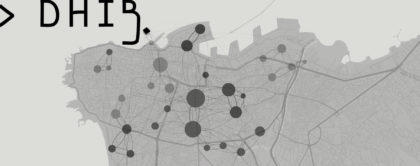The Digital Humanities Institute 2017 at the American University of Beirut brought Researchers, Professors, Librarians, IT and other Scholars together to talk about many topics from the varying points-of-view of every participant, exchange ideas and forge plans for future endeavors.
A big thank you goes to the Center for Arts and Humanities at AUB and the AMICAL Consortium. The Organisers Fatmeh Charafeddine (Jafet Library), Rayane Fayed (IT), Mario Hawat (English major), Najla Jarkas (English) and David Wrisley (English) deserve a very special Thank You for their hard work and perfect preparations!
Both DHIB Keynotes are available on Youtube:
- David Wrisley: Digital Humanities in the Arab World: Current Context and Future Perspectives
- Ghassan Mourad: التعرف الآلي على أسماء العلم باللغة العربية؟
On the first two days, we visited he OCR-Panel at Jafet Library, held by Nina Ghannam and Vera Al Ashkar, in which there where many interesting things to be learnt about the difficulties of preparing Arabic Texts for OCR. They showed us both the free alternative GIMP, which we could try out in a Hands-On to deskew and clean up scans. Vera also demonstrated the licensed Adobe Photoshop, which makes working on especially hard cases (such as books with stains) and large numbers of pages at once a lot easier.
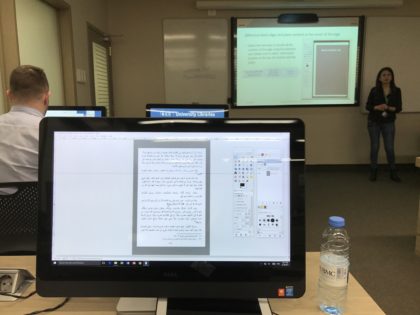
Vera Al Askar demonstrating image preparation with GIMP
The second day was dedicated to the OCR itself – using on the on side the professional software Sakhr, used by Jafet Library, and the OpenSource Alternative Viet-OCR, running on Google’s Tesseract on the other side. The results showed the actual use of the image preparation before: The edited images showed a much higher accuracy when using OCR than their unedited original files.
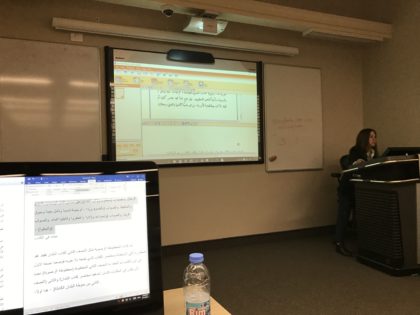
Nina Ghannam demonstriert die Vorbereitung von OCR bei Sakhr
In the afternoon, we where also invited to the digitisation lab, in which books are digitsed as well as journals, newspapers and microfilms.
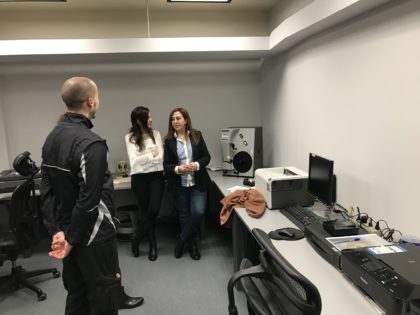
vrnl: Nina Ghannam, Vera Al Ashkar und Felix Wiedemann im Digitisation Lab
The Lightning Talk-Session of the DHIB invitied participants to give short presentations of projects or infrastructures and invite others to collaborate. Time passed very quickly though, as more speakers would have been easy to find in this workshop.
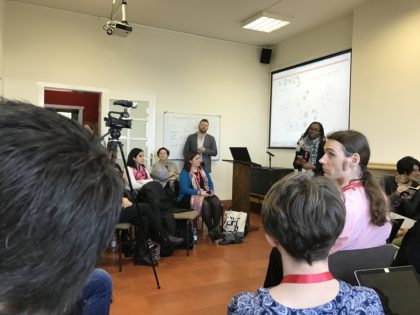
Lightning Talk Session
The last day of the Workshop hat smaller sessions, we decided to have a look at the Hands-On session for Voyant Tools – a toolkit for Distant Reading and Analysis of texts working web-based. It is available in Arabic since last year as well.
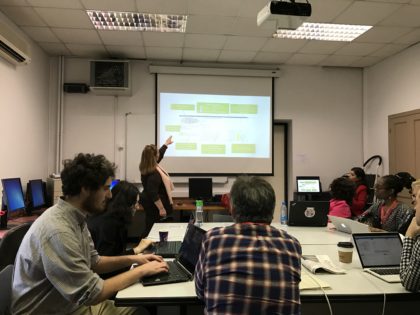
Najla Jarkas erklärt die Nutzung von Voyant Tools
The Closing of DHIB took place at a balcony due to the good weather and gave the participants time to have their say. David Wrisley led the discussion by asking the questions “How do you tell folks back home what you did here?” and “What will be the next step?”
This is of course a very personal review, showing only a small part of all the things that made the DHIB 2017 a wonderful experience: We had great panels on Game Design, Drupal, Python, Omeka, Plaintext Editing, TEI, Pädagogik and Mapping as well – and sadly not enough time to visit every single one.
What was very apparent (and has been in past DH workshops as well) is the affinity of Digital Humanities and Twitter, the Social Network of Choice for networking. The #DHIB2017 Hashtag shows all the Tweeting that happened at the Workshop. You can find the full programme original post of DHIB.
